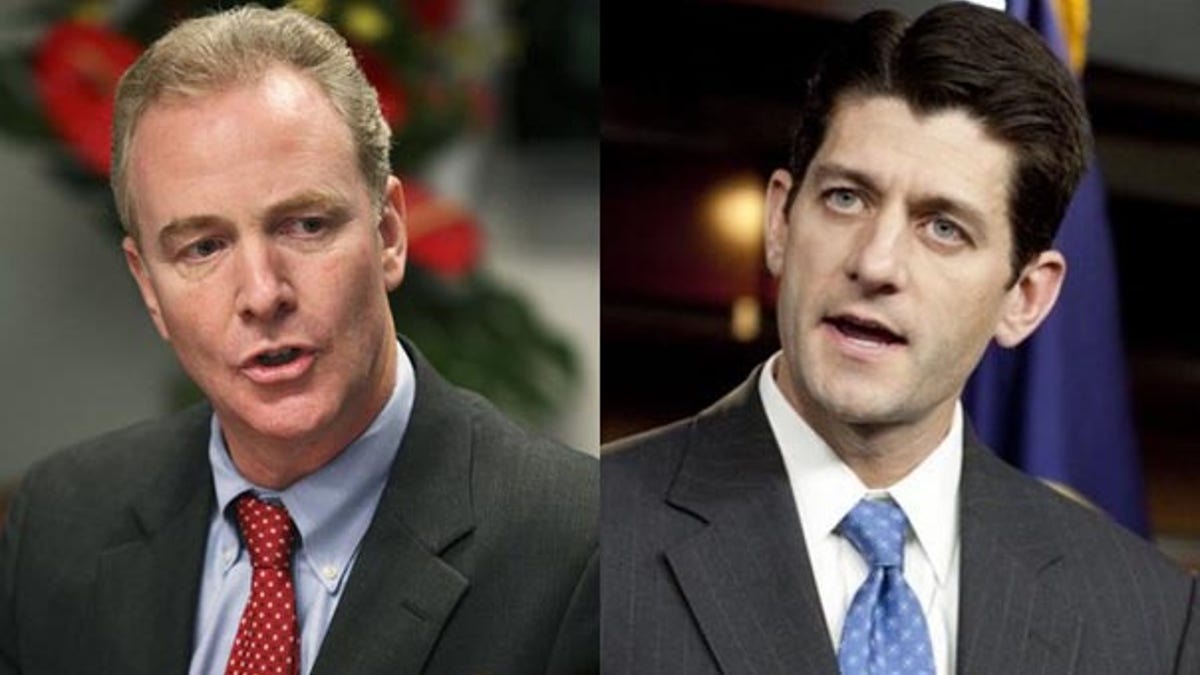
Reps. Chris Van Hollen, D-Md., left, and Paul Ryan, R-Wis. (Reuters/AP)
The architect of the House Republican plan for overhauling Medicare says it's time to move beyond petty politics and focus on dealing with the nation's fiscal problems, and he's challenging Democrats to show leadership on budget cuts.
Rep. Paul Ryan, R-Wis., chairman of the House Budget Committee, on Sunday played down a recent flap with presidential candidate Newt Gingrich, who two weeks earlier called Ryan's Medicare proposal "right-wing social engineering." Gingrich took his words back a few days later after he was criticized by conservatives. Gingrich also called Ryan to apologize.
Ryan said Gingrich's critique was "deeply inaccurate and a gross mischaracterization," but he's not surprised since the plan has been distorted by people who wish to take political advantage by creating confusion about it.
"We're offering details. We have no partners on the other side of the aisle offering anything but misleading scare tactics," Ryan said on NBC's "Meet the Press." "Of course people are scared of entitlement reform because every time you put entitlement reform out there, the other party uses it as a political weapon against you."
Ryan insisted that his plan will not affect anyone 55 and over. He said the idea behind it is not so revolutionary either.
"It's in keeping with the Bill Clinton bipartisan commission to reform Medicare, it's an idea that's been around for a long time called premium support, guaranteed coverage options for Medicare where the government subsidizes the poor and the sick a whole lot more than the wealthy and people get to choose," Ryan said.
Ryan said the other option is to go with President Obama's proposal, which he claimed will "give the government the power to deny care to seniors by empowering a panel of 15 unelected bureaucrats to put price controls and rationing in place for current seniors."
The entitlement fix is part of a larger problem with out-of-control deficit spending. The U.S. has a $14.3 trillion debt, and is maxed out on its credit, though lawmakers plan to increase the spending limit on themselves in order not to default on their existing debt.
As Ryan pushes for Medicare and Medicaid reforms to reduce the amount of spending, Rep. Chris Van Hollen, D-Md., ranking minority on the House Budget Committee, said debt reduction must come from both sides of the ledger -- and that means increasing revenues.
"Political courage on the Republican side means taking on the revenue piece," Van Hollen said later on the same show. "Senator (Tom) Coburn raised his head on that. (Americans for Tax Reform President) Grover Norquist tried to chop it off. It doesn't take a lot of courage on the Republican side to slash Medicaid by $700 billion."
Van Hollen said he prefers a "broad-based tax" that would increase personal income rates to the level it was during the Clinton administration. He called Ryan's approach out of whack.
"It's a question of balance. We think we want to reduce the deficit, that involves spending cuts, it involves the revenue piece. By saying spending, what you're saying you want to whack Medicare and Medicaid only. You only want to deal with the spending side," he said.
"The bipartisan groups that have looked at this, every one of them have said any credible plan requires both. That's what we're saying."
But Ryan said that Democrats "haven't even proposed or passed a budget for 753 days." He added that while he's willing to negotiate on his plan, he's not going to talk about alternatives with people who don't offer concrete solutions and only want to score political points.
"We have nothing, nothing from the president or from the Senate Democrats that come anywhere close to averting a debt crisis and fixing our problem," he said. "If you want to be a serious leader, you've got to deal with this."




